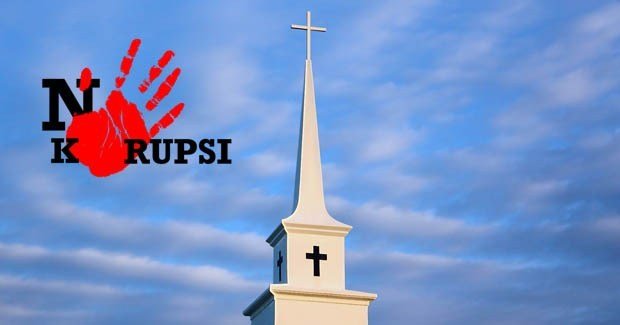
Civis 002/2015
Before we start talking about the church’s strategy to eradicate corruption, firstly we have to define what corruption is, secondly, the theological foundation for the involvement of church in eradicating corruption and thirdly, the internal struggles of the church from involving themselves in corruption eradication.
I. Definition
The word “corruption” is frequently used in many situations thus it became unclear on what exactly does eradicating means. One example is the usage of said word in the term “time corruption”. There are also hidden meaning, for example corruption in the church or companies, which I prefer to be better termed as manipulation of money.[Note:2]
The “corruption” that became the objective of Komisi Pemberantasan Korupsi (KPK) or The Corruption Eradication Commission here is not the manipulation or dishonesty in usual business (business ethics), but instead is the act of a civil servant or government officer who uses their power to influence public policies which will harm the state or for private (individual or group) interest.
The Latin word of it, corruptio, has the meaning of decay. Corruption causes the decaying of profession and economy. Meritocracy is not working. Strategic positions are held by ones who are able to pay for it, regardless of competence and performance. Economical cost is high. It is also based neither on competence nor performance. It results in low quality development, e.g. frail bridges, the collapse of school buildings, cracked asphalts on roads, damaged roads and also traffic jam which causes delayed distribution of goods.
The kind of corruption we face is very complex because it is not an individual case anymore. Corruption is done systematically in every level and in mass numbers. From the bottom to the top level are involved. The ones doing corruption in the top level allows their subordinates to do the same thing in a smaller scale. Corruption is also done through conspiracy between government officials, even to different ministries and sectors. These corrupted officials then hide behind the state institutions which still gives them free reign to keep doing corruption.
II. Theological Principles
There are two theological principles for church participation in eradicating corruption. Firstly, Christians have double citizenship. Citizens of the heavenly and earthly kingdoms. The moral consequence is that Christians have obligations toward God and the state. In this sense we understand Jesus’s saying, “Therefore render to Caesar the things that are Caesar’s, and to God the things that are God’s.” (Matt. 22:21). It is true that this example relates to tax paying. However, substantially, its application can be broadened. As a citizen, a Christian has a political responsibility to prevent the state from a decay due to increasing corruption.
Secondly, if the people prosper, the Christian among them will automatically prosper too. This is how we should understand Jeremiah’s prophecy, “But seek the welfare of the city where I have sent you into exile, and pray to the Lord in its behalf, for in its welfare you will find your welfare.” (Jer. 29:7). So far, Indonesia is still among the two thirds of 175 most corrupt states (scores under 50). There is a direct correlation between corruption and welfare. As a result of widespread corruption, the state’s social capacity to bring welfare to the society becomes ineffective.
According to the statistics from BPS or the Central Agency for Statistics (March 2014), in Indonesia there are 28,28 million people in poverty with income lower than Rp. 302,735 per capita per year. Then, 68 million people are in poverty risk if there is an economic shock (sickness, disaster, losing job). The condition of people in poverty and poverty risk is the same. According to the World Bank, there are 125 million people with a maximum expense of USD 2.00 per day. The big loser in a corrupt system is the lower class people who lose their right to welfare. The moderate Muslims have begun talking about “anti corruption jihadist”. The church should have a clear stand against corruption as a problem facing this nation, if they are consistent with their double citizenship status and care about poverty alleviation. If not, then the church will be viewed only as a guest in this republic.
(Continued)
(This paper was presented in the Church and Politics Strategic Forum held by Leimena Institute in Jakarta on February 9-12, 2015).

Rev. Yonky Karman, PhD
Lecturer, Jakarta Theological Seminary
Rev. Yonky Karman, PhD is a social observer and lecturer at the Jakarta Theological Seminary. The KOMPAS newspaper awarded him the 2015 Dedicated Intellectual.
